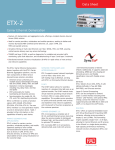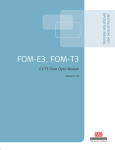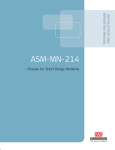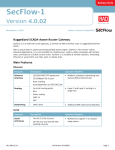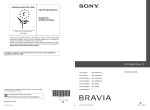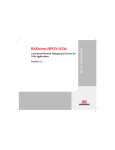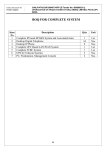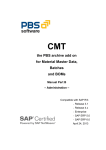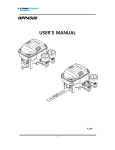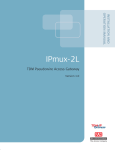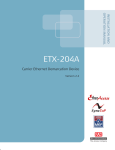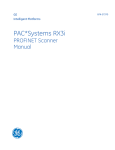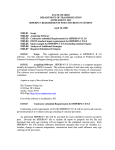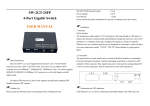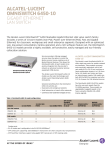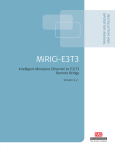Download ETX-203A - RADProductsOnline
Transcript
preliminary Feature-rich, best price-performance demarcation point for SLA-based Ethernet business services Data Sheet ETX-203A Carrier Ethernet Demarcation Device • Feature-rich Carrier Ethernet demarcation device delivers end-to-end service and transport (up to 4 Gbps) • MEF-compliant, services with CIR/EIR traffic profiles and hierarchical traffic management • Sub microsecond per EVC.CoS SLA measurements with ASIC-powered ITU-T Y.1731 functionality • Test throughput across routed/switched networks up to line rate by using Layer-2/3 loopbacks and Layer-2 RFC-2544 traffic generator and analyzer • Quickly pinpoint network defects with complete OAM toolset: ITU-T Y.1731, IEEE802.1ag, IEEE802.3ah The ETX-203A Carrier Ethernet demarcation device delivers SLA-based business services to the customer premises over native Ethernet access. The ASIC-based architecture provides powerful traffic management that allows the service provider to control bandwidth and ensure traffic SLA. The ASIC-based ETX-203A is extremely price competitive, ensuring SDH/SONET-like performance and Five Nines reliability for IP VPN and VoIP transport, as well as for dedicated Internet access and Layer-2 LAN-to-LAN services, all with differentiated quality of service and end-to-end monitoring. ETX-203A features hardware-powered OAM that supports multiple flow monitoring at line rate. It provides 15 different SLA tools to assure and control the traffic by the service provider around the clock. ETX-203A enables the pay-us-when-yourcustomers-pay-you business model with easy capacity expansion by software license. ETX-203A is a compact low power consumption demarcation device that delivers MEF 9 and MEF 14 certified services. It provides Ethernet uplink NNI ports as well as UNI ports. The Access Company ETX-203A Carrier Ethernet Demarcation Device FLEXIBLE TRAFFIC MAPPING QOS ETHERNET OAM Traffic is mapped to the Ethernet flows (EVCs) using very flexible classification criteria that can be combined, for example: Different service types require different levels of QoS to be provided end-to-end. QoS can be defined per subscriber as well as per service. QoS has three aspects: rate limitation, traffic shaping, and traffic prioritization. Featuring ultra fast, hardware-powered processing, ETX-203A performs OAM and PM measurements in line rate with maximum precision, offering the following powerful benefits: • VLAN + VLAN priority • VLAN + IP precedence • VLAN + DSCP • Ether Type • IP/MAC source/destination address • Untagged. More classification criteria and combinations can be found in the user manual. HIERARCHICAL SCHEDULING AND SHAPING PER FLOW Every flow has its own queues and scheduler. ETX-203A supports up to 192 flows, and a total of 16 or 30 queue blocks per network port. Each queue block is a group of eight queues per CoS. Each flow can be bound to each queue block. Traffic policing is applied per flow or group of flows, and operates according to the dual token bucket mechanism based on user-configurable CIR + CBS and EIR + EBS. Traffic can be limited to the line rate or the data rate. For prioritizing user traffic, ETX-203A maps user traffic to up to eight separate queues per service. Each can be configured as strict priority queues or weighted fair queues (WFQ). Immediate detection of loss of continuity (LOC), ensuring under 50ms protection switching • Highly accurate frame loss measurements with live traffic testing • Flow-level monitoring, enabling simultaneous processing of hundreds of OAM sessions • Loopback testing at line rate. ETX-203A provides these types of Ethernet OAM: • Single-segment (link) OAM according to IEEE 802.3-2005 (formerly 802.3ah) for remote management and fault indication in active and passive mode, including remote loopback, dying gasp, and MIB parameter retrieval. • End-to-end connectivity OAM based on IEEE 802.1ag-D8 that enables Ethernet service providers to monitor their services proactively and guarantee that customers receive the contracted SLA • End-to-end service and performance monitoring based on ITU-T Y.1731. Fault monitoring and end-to-end performance measurement include frame delay, frame delay variation, frame loss and availability. The queues handle traffic with different service demands, such as real-time traffic, premium data, or best-effort data. The device uses the WRED policy to ensure that in case of congestion, green packets are not dropped (yellow packets may be dropped). TYPICAL APPLICATIONS ETX-203A is used in the following MEF-defined applications: • Figure 1. Ethernet Virtual Private Line • Ethernet Private Line (EPL) – Site-to-site connectivity over dedicated bandwidth without service multiplexing (see Figure 1) • Ethernet Virtual Private Line (EVPL) – Site-to-site connectivity over shared bandwidth with service multiplexing (see Figure 3) • Ethernet LAN – Site-to-site connectivity over dedicated bandwidth with or without service multiplexing. RFC-2544 The device provides a built-in RFC-2544 wirespeed traffic generator and analyzer for unidirectional and bidirectional testing of throughput, latency and frame loss. The tests are done over any Layer-2, based on standard OAM messages. Figure 2. RAD Ether ASIC Chip Data Sheet NETWORK INTERFACE RESILIENCY FAULT PROPAGATION SECURITY Flow-based resiliency on uplinks is provided, as well as G.8031 – Ethernet linear protection on the network ports. The unit provides a user-configurable fault propagation mechanism in the network-to-user or user-to-network direction. When a link failure is detected or OAM failure received, ETX-203A can shut down the affected port or forward the OAM failure message. The fault propagation mechanism enables routers and switches connected to both ends of the link to reroute the traffic to the redundancy path. The following security protocols are provided by ETX-203A to ensure client server communication privacy and correct user authentication: ETX-203A implements EPS Ethernet Path protection according to ITU-T G.8031. The device can protect one or multiple EVCs in the network via standard APS messages and via OAM ETH AIS/LOC criteria, ensuring protection switching under 50 msec. The protected EVC can run over one uplink or dual uplinks per customer requirement. • RADIUS (client authentication) • TACACS+ • SSH for Secure Shell communication session. Pay-us-when-your-customers-pay-you business model: The protection is available for the following topologies: The unit can be managed using the following ports and applications: • End-to-end EPS path protection for one or multiple EVCs transported over MPLS/VPLS access network • Local management via an ASCII terminal connected to the RS-232 port • Opposite standard PE supporting G.8031 EPS. • Additionally, the following protection methods are provided via port-based resiliency on the network ports: Remote inband management via user or network ports routed via separate VLANs, Telnet, or a third-party OSS system • Out-of-band management via a dedicated management port • Link aggregation (LAG) based on 802.3ad • SFTP – Secure File Transfer Protocol. • Dual homing (1:1), allowing ETX-203A to be connected to two different upstream devices. TRAP SYNCHRONIZATION COLOR-AWARE P-BIT RE-MARKING SNMPv3 LICENSING MANAGEMENT Traps are sent with sequence IDs to network manager groups, to enable the managers to detect when traps are lost and request the traps be sent again. • • Save Opex by using cost-optimized demarcation device at customer site with throughput up to 100Mbps, increasing capacity by software license to up to 1000Mbps when capacity is growing • Buy additional number of EVCs per software license. INTEGRATED SMART SFP SUPPORT Integrated management of smart MiRIC/MiRICi SFPs provides E1/T1/E3/T3 STM1 or OC3 Eth over PDH or SDH legacy networks. The ETX-203A management includes MiRIC/MiRICi configuration and statistic collection. The VLAN priority bit in Ethernet frames can be modified at network ingress according to the ‘color’ of the frame. This allows service consistency and QoS continuity across color-aware (Drop Eligible-enabled) as well as color-unaware networks. Figure 3. Ethernet Virtual Line Figure 4. Smart SFPs MiRICi-E1T1 and MiRICi-E3T3 ETX-203A Carrier Ethernet Demarcation Device LAYER-2/ LAYER-3 LOOPBACK WITH MAC AND IP ADDRESS SWAPPING As services and networks become more complex, tracking service and network faults is very important for conforming to the SLA. Therefore it is vital that the service provider can perform network loopbacks to easily track failures. Layer-2 and/or layer-3 network integrity can be tested by a non-disruptive loopback performed per flow, with swapping of MAC address and optionally IP address. When the loopback is activated, ETX-203A exchanges the source and destination MAC/IP addresses of the incoming packets. This loopback passes through Ethernet bridges (MAC address) and routers (IP address). DYING GASP ETX-203A reports power failures to defined network management stations by sending an IEEE 802.3-2005 message and trap, thus enabling the unit to properly disconnect from the network with notification of the reason for the service problem. L2CP HANDLING DHCP ETX-203A can be configured to pass through Layer-2 control frames (including other vendors’ L2CP frames) across the network, to peer supported protocols (IEEE 802.3-2005 and LACP), or to discard the L2CP frames. IP address, IP mask, and default gateway can be automatically obtained using DHCP. COMMAND LINE INTERFACE JUMBO FRAMES AND EGRESS MTU Databases and scripts of commonly used commands can be easily created and applied to multiple units using command line interface. The unit supports large frames of up to 12 Kbytes. UNIVERSAL POWER SUPPLY COMPACT SIZE The ETX-203A power supply inlet can be connected to AC or DC power. The unit is supplied in a compact 8.5-inch 1U high enclosure. MOUNTING OPTIONS ETX-203A can be rack mounted with a dedicated RM kit (see ordering options) or can be wall mounted (see user manual for instructions). Data Sheet Table 1. OAM and SLA Tools Feature Tool Connectivity Verification IEEE 802.3-2005 heartbeat IEEE 802.1ag CC IEEE 802.1ag LB, MAC Ping Fault Detection and Isolation IEEE 802.1ag LT, MAC trace route IEEE 802.1ag LB, MAC Ping Fault Propagation Subscriber port shutdown ITU-T Y.1731 RDI IEEE 802.3ah dying gasp, SNMP trap Diagnostic Loopbacks Layer-1 loopback IEEE 802.3-2005 loopback Layer-2/3 loopback with MAC/IP swap per EVC/VLAN/Source Address Performance Management ITU-T Y.1731: Packet Loss, PD, PDV, Per EVC.cos statistics, HW powered OAM RFC-2544 generator and analyzer ETX-203A Carrier Ethernet Demarcation Device Specifications NETWORK INTERFACE Number of Ports Up to 2: • Ports 1 and 2 can serve as an uplink with redundancy • Port 2 can serve as a network or user port Type Fiber optic: Fast Ethernet (100BaseFx, 100BaseLX10, 100BaseBx10), SFP-based Gigabit Ethernet (1000BaseSx, 1000BaseLX10, 1000BaseBx10), SFP-based (according to license) Copper: 10/100BaseT or 10/100/1000BaseT (according to license) Connector Port 1: SFP slot Port 2: SFP slot or RJ-45 SFP Transceivers For full details, see the SFP Transceivers data sheet at www.rad.com USER INTERFACE Number of Ports Up to 3 (second Ethernet port can serve as network or user) Type See network interface specifications Connector SFP slot or RJ-45 SFP Transceivers For full details, see the SFP Transceivers data sheet at www.rad.com Note: It is strongly recommended to order this device with original RAD SFPs installed. This will ensure that prior to shipping, RAD has performed comprehensive functional quality tests on the entire assembled unit, including the SFP devices. RAD cannot guarantee full compliance to product specifications for units using non-RAD SFPs. MANAGEMENT PORTS Out-of-Band Ethernet Management Port Type: 10/100BaseT Connector: RJ-45 Control Port Interface: V.24/RS-232 DCE Connector: RJ-45 Format: Asynchronous Data rate: 9.6, 19.2, or 115.2 kbps GENERAL Max. Frame Size 12,288 bytes Compliance MEF 9, MEF 14: EPL and EVPL MEF 6 (E-Line – EPL and EVPL), MEF 10 IEEE 802.3, 802.3u, 802.1q, 802.1p, 802.3ad, 802.3-2005, 802.1ag-D8 ITU-T G.8031, Y.1731, RFC-2544 Indicators PWR (green): On –ETX-203A is powered up 1–6 (green): On – Corresponding Ethernet link OK Blinking – Data is being transmitted and received on the Ethernet link LINK/ACT (green): On – Ethernet link OK Blinking – Data is being transmitted and received on the Ethernet link Power AC/DC inlet connector with auto detection Wide-range AC power supply: 100–240 VAC, 50/60 Hz DC power supply: 48V (40–370 VDC) Power Consumption 8W Physical Plastic enclosure Height: 43.7 mm (1.7 in) Width: 215 mm (8.4 in) Depth: 150 mm (5.9 in) Weight: 2.4 kg (5.2 lb) Environment Temperature: 0–50°C (32–122°F) Humidity: Up to 90%, non-condensing Data Sheet Table 2. ETX Family Comparison Table ETX-203A (Ver. 3.0B) Feature Size Function ETX-204A (Ver. 3.0B) Height: 43.7 mm (1.7 in) 8.4” unit: Width: 215 mm (8.4 in) Height: 43.7 mm (1.7 in) Height: 43.7 mm (1.7 in) Depth: 150 mm (5.9 in) Width: 215 mm (8.4 in) Width: 440 mm (17.4 in) Depth: 300 mm (11.8 in) Depth: 240 mm (9.5 in) Basic NTU Advanced NTU (SW license) Premium NTU ASIC based ASIC based Flexi core Bandwidth 100 Mbps per port 100/1000 Mbps per port 100/1000 Mbps per port Circuit validation and PM (H/W OAM, MEP/MIP, RFC-2544, L1/L2/L3 loops) Yes Yes Yes Flow classifications and policing Yes Yes Yes G.8031, HQoS and per EVC shaping Yes Yes Yes Number of flows (EVC.cos) / shapers / MEPs 192/16/128 192/30/128 192/30/128 Ethernet ports (Net/net – User/user) 1/1/2 1/1/2 1/1/2 or 1/1/4 SFP/UTP SFP/UTP SFP/UTP combo E1/T1, E3/T3, OC-3/STM-1 bridging Supported, includes integrated management 17.4” unit: Supported, includes integrated management Timing options No Yes (SyncE, 1588v2 master/slave) External temperature range option No Yes Power supply AC/DC AC/ACR/DC/DCR Data Sheet ETX-203A Carrier Ethernet Demarcation Device Table 3. Recommended Ordering Options ETX-203A/NP/+2/+3 Legend Option NP Software Package (Default= 100Mbps per port and 16 shaped EVCs): GE 1 Gbps per port GE30 1 Gbps per port, 30 shaped EVCs +2 Two Ethernet network ports or network and user port 1SFP1UTP 1 SFP Ethernet slot, 1 UTP Ethernet port 2SFP 2 SFP Ethernet ports +3 Ethernet User Ports 2UTP 2 UTP Ethernet ports Configuration Description Device ETX-203A/GE/1SFP1UTP/2UTP 1 SFP Gigabit Ethernet slot and 3 UTP Gigabit Ethernet ports, 16 shaped EVCs ETX-203A/GE/2SFP/2UTP 2 SFP Gigabit Ethernet slots and 2 UTP Gigabit Ethernet ports, 16 shaped EVCs ETX-203A/1SFP1UTP/2UTP 1 SFP Fast Ethernet slot and 3 UTP Fast Ethernet ports, 16 shaped EVCs ETX-203A/2SFP/2UTP 2 SFP Fast Ethernet slots and 2 UTP Fast Ethernet ports, 16 shaped EVCs ETX-203A/GE30/1SFP1UTP/2UTP 1 SFP Fast/Gigabit Ethernet slot and 3 UTP Fast/Gigabit Ethernet ports, 30 shaped EVCs SUPPLIED ACCESSORIES ETX-203A/GE30/2SFP/2UTP CBL RJ45/D9/F/6FT Control port cable with male RJ-45 and female DB-9 connector 2 SFP Fast/Gigabit Ethernet slots and 2 UTP Fast/Gigabit Ethernet ports, 30 shaped EVCs Item ETX-203A_SW/GE License for 1 Gbps per port ETX-203A_SW/GE30 License for 1 Gbps per port and 30 shaped EVCs OPTIONAL ACCESSORIES License Packages ETX-203A_SW/NP NP Software package GE 1 Gbps per port GE30 1 Gbps per port, 30 shaped EVCs RM-33-2 Hardware kit for mounting one or two ETX-203A units in a 19" rack International Headquarters 24 Raoul Wallenberg Street Tel Aviv 69719, Israel Tel. 972-3-6458181 Fax 972-3-6498250, 6474436 E-mail [email protected] www.rad.com North America Headquarters 900 Corporate Drive Mahwah, NJ 07430, USA Tel. 201-5291100 Toll free 1-800-4447234 Fax 201-5295777 E-mail [email protected] Order this publication by Catalog No. 803944 The Access Company 530-200-08/10 (3.0B) Specifications are subject to change without prior notice. © 2010 RAD Data Communications Ltd. The RAD name, logo, logotype, and the terms EtherAccess, TDMoIP and TDMoIP Driven, and the product names Optimux and IPmux, are registered trademarks of RAD Data Communications Ltd. All other trademarks are the property of their respective holders. Ordering








